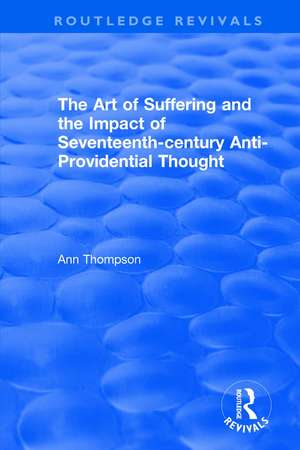The Art of Suffering and the Impact of Seventeenth-century Anti-Providential Thought: Routledge Revivals
Autor Ann Thompsonen Limba Engleză Paperback – 11 noi 2019
| Toate formatele și edițiile | Preț | Express |
|---|---|---|
| Paperback (1) | 190.23 lei 6-8 săpt. | |
| Taylor & Francis – 11 noi 2019 | 190.23 lei 6-8 săpt. | |
| Hardback (1) | 459.00 lei 6-8 săpt. | |
| Taylor & Francis – 27 oct 2017 | 459.00 lei 6-8 săpt. |
Din seria Routledge Revivals
- 9%
 Preț: 801.71 lei
Preț: 801.71 lei - 8%
 Preț: 432.64 lei
Preț: 432.64 lei -
 Preț: 153.83 lei
Preț: 153.83 lei -
 Preț: 230.80 lei
Preț: 230.80 lei -
 Preț: 309.79 lei
Preț: 309.79 lei -
 Preț: 258.73 lei
Preț: 258.73 lei - 9%
 Preț: 764.35 lei
Preț: 764.35 lei - 9%
 Preț: 903.42 lei
Preț: 903.42 lei -
 Preț: 311.18 lei
Preț: 311.18 lei -
 Preț: 357.45 lei
Preț: 357.45 lei - 9%
 Preț: 606.36 lei
Preț: 606.36 lei -
 Preț: 317.54 lei
Preț: 317.54 lei - 9%
 Preț: 764.30 lei
Preț: 764.30 lei -
 Preț: 257.01 lei
Preț: 257.01 lei -
 Preț: 238.40 lei
Preț: 238.40 lei -
 Preț: 259.48 lei
Preț: 259.48 lei - 9%
 Preț: 903.81 lei
Preț: 903.81 lei -
 Preț: 326.26 lei
Preț: 326.26 lei -
 Preț: 258.67 lei
Preț: 258.67 lei -
 Preț: 294.98 lei
Preț: 294.98 lei -
 Preț: 308.89 lei
Preț: 308.89 lei -
 Preț: 199.86 lei
Preț: 199.86 lei -
 Preț: 347.50 lei
Preț: 347.50 lei -
 Preț: 302.59 lei
Preț: 302.59 lei -
 Preț: 389.40 lei
Preț: 389.40 lei -
 Preț: 257.01 lei
Preț: 257.01 lei -
 Preț: 343.22 lei
Preț: 343.22 lei - 9%
 Preț: 640.91 lei
Preț: 640.91 lei - 9%
 Preț: 619.49 lei
Preț: 619.49 lei -
 Preț: 228.88 lei
Preț: 228.88 lei -
 Preț: 265.16 lei
Preț: 265.16 lei -
 Preț: 245.11 lei
Preț: 245.11 lei -
 Preț: 258.54 lei
Preț: 258.54 lei -
 Preț: 258.73 lei
Preț: 258.73 lei -
 Preț: 368.93 lei
Preț: 368.93 lei -
 Preț: 246.38 lei
Preț: 246.38 lei - 9%
 Preț: 832.08 lei
Preț: 832.08 lei -
 Preț: 258.67 lei
Preț: 258.67 lei -
 Preț: 286.99 lei
Preț: 286.99 lei - 18%
 Preț: 695.86 lei
Preț: 695.86 lei - 9%
 Preț: 934.96 lei
Preț: 934.96 lei - 5%
 Preț: 243.38 lei
Preț: 243.38 lei -
 Preț: 274.69 lei
Preț: 274.69 lei -
 Preț: 200.67 lei
Preț: 200.67 lei - 9%
 Preț: 638.62 lei
Preț: 638.62 lei -
 Preț: 259.69 lei
Preț: 259.69 lei - 9%
 Preț: 1038.47 lei
Preț: 1038.47 lei -
 Preț: 389.46 lei
Preț: 389.46 lei -
 Preț: 302.14 lei
Preț: 302.14 lei -
 Preț: 302.27 lei
Preț: 302.27 lei
Preț: 190.23 lei
Preț vechi: 230.45 lei
-17% Nou
Puncte Express: 285
Preț estimativ în valută:
36.41€ • 37.87$ • 30.05£
36.41€ • 37.87$ • 30.05£
Carte tipărită la comandă
Livrare economică 15-29 aprilie
Preluare comenzi: 021 569.72.76
Specificații
ISBN-13: 9781138719002
ISBN-10: 1138719005
Pagini: 226
Dimensiuni: 156 x 234 mm
Greutate: 0.42 kg
Ediția:1
Editura: Taylor & Francis
Colecția Routledge
Seria Routledge Revivals
Locul publicării:Oxford, United Kingdom
ISBN-10: 1138719005
Pagini: 226
Dimensiuni: 156 x 234 mm
Greutate: 0.42 kg
Ediția:1
Editura: Taylor & Francis
Colecția Routledge
Seria Routledge Revivals
Locul publicării:Oxford, United Kingdom
Cuprins
Contents: Preface; Introduction; The godly life art of suffering; The content of the godly life art of suffering; The art of suffering in the context of the life of faith; The form of the art of suffering in the second part of the 17th century; The doctrine of contentment; The art of contentment: Joseph Hall's The remedy of discontentment (1645), Jeremiah Burroughes' The rare jewel of Christian contentment (1648), Jeremy Taylor's Of contentednesse in all estates and accidents (1650), Thomas Watson's The art of divine contentment (1653), Simon Patrick's The hearts ease (1659), and Richard Allestree's The art of contentment (1675); The defence of God in Jeremiah Burroughes' The rare jewel of Christian contentment (1648), Thomas' Brooks' The silent soul (1659) and William Bates' The great duty of resignation to the divine will in affliction (1684); The response to the problem of accusations of imperfection against God in Richard Allestree's The art of contentment (1675) and James Bardwood's Heart-ease in heart-trouble (1690); The defence of God's government of the world in Richard Baxter's Obedient patience (1683) and Nathaniel Spinckes' Of trust in God (1696); Epilogue; Appendices; Bibliography; Index.
Recenzii
'... attractively produced volume... The depth and and breadth of research [...] fully deserves commendation for its exactitude and methodology.' The United Reformed Church History Society Journal
Descriere
This title was first published in 2003. "The art of suffering" is one of many strands of literature on suffering published in the sixteenth and seventeenth centuries. This book explores through the art of suffering the way in which the meaning for suffering, which the seventeenth century inherited from the Middle Ages and which centres on the role of suffering as a manifestation of the hand of God in the process of salvation, is refined and enhanced by successive puritan writers only to crumble under the impact of emerging anti-providential thought. It goes on to explore the challenge which the absence of meaning for suffering presents to the Judaeo-Christian concept of an omnipotent and infinitely good God, and the ways in which themes and doctrines already present in the literature on suffering are reshaped and recombined to defend the omnipotence and infinite goodness of God.
